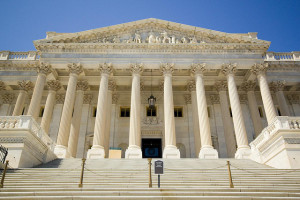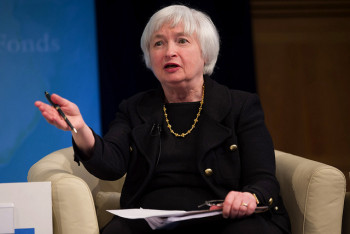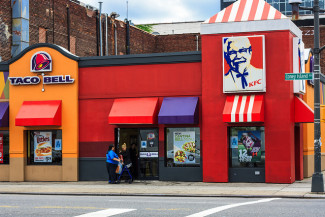By Peter Ward October 30, 2015
House Passes Two-Year Budget Deal

U.S. Capitol. ©Brandi Korte
U.S. Congress passed a bipartisan budget deal on Wednesday that will boost spending and extend the country’s debt limit into 2017.
The agreement was passed on a 266 to 167 vote in the House of Representatives on Wednesday afternoon, and leaders in the Senate have promised to move the bill through quickly.
Should the deal pass in the Senate, it will effectively end the budget battles President Obama has faced with Republicans, as it pushes the next round of fiscal negotiations to after the 2016 Presidential election.
The deal will increase Federal spending by around $80 billion over the next two years, and the new spending power will be distributed evenly over military and non-military programs. Most House Republicans voted against the bill, but others came out in support of it prior to the vote. House Armed Services Committee Chairman Mac Thornberry, a Republican from Texas, said the bill would help the military.
“It stops the cuts in defense, it increases the money going to our troops and it prevents them from being used as a bargaining chip in the future,” Thornberry said. “I think that is the sort of stability and predictability they need and that they deserve.”
Senator Rand Paul, a Republican Presidential candidate, has already said he will filibuster the measure in the Senate. However, as the Senate can end a filibuster with 60 votes, it is unlikely he will be able to stop the bill being passed.
Fed Holds Off on Interest Rates Hike

Federal Reserve Chairman Janet Yellen. © International Monetary Fund
The U.S. Federal Reserve revealed on Wednesday it had decided to keep interest rates unchanged at its latest meeting.
U.S. interest rates have been kept at record lows since December 2008, although the Fed has previously suggested rates will rise in the coming months.
“The Committee continues to see the risks to the outlook for economic activity and the labor market as nearly balanced, but is monitoring global economic and financial developments,” the Fed said in a statement.
The Fed’s fears that the U.S. economy is not expanding quickly enough were partially confirmed on Thursday morning, when a Commerce Department report revealed Gross Domestic Product growth slowed to 1.5% in the third quarter of the year. The second quarter had seen a 3.9% increase.
However, the slowdown was mostly due to businesses working off inventory backlogs, and cutting back on restocking warehouses as a result. This inventory glut is expected to be temporary, and strong domestic demand suggests growth will increase in the next quarter.
There were hints by the Federal Reserve that an interest rate hike could be possible in December. The Fed’s statement made reference to possible tightening of policies in the next meeting. Investors seemed to take the possibility of a December rate hike seriously, as futures contracts implied a 43% chance of interest rates being raised, compared to 34% prior to the Fed’s statement.
Top 100 CEOs Sitting On $4.9bn Retirement Savings

Yum Brands’ Taco Bell and KFC ©drpavloff
The top 100 CEOs in the U.S. are sitting on retirement savings equal to $4.9 billion – the same amount saved by 116 million of the poorest Americans, a new study released on Wednesday finds.
The research, by the Center for Effective Government and Institute for Policy Studies, shows that the accumulated retirement savings of the 100 chief executives are also equal to the pensions of 41% of U.S. families combined.
David Novak, the executive chairman of Yum Brands, which owns KFC, Taco Bell and Pizza Hut, was found to be sitting on the largest pension. Novak’s retirement savings total $234 million, which will translate to monthly retirement payments of $1.3 million for the rest of his life.
In contrast, those employees at Yum who do have a 401(k) have an average balance of $70,167, 3,300 times lower than Novak’s.
“The CEO-worker retirement divide has turned our country’s already extreme income divide into an even wider economic chasm. And what few realize is that the trends of expanding CEO pensions and increasing worker retirement insecurity are inextricably linked,” Sarah Anderson, one of the authors of the Institute for Policy Studies report said.
Pay and income equality has been a popular issue among Presidential candidates during recent Democratic and Republican debates, but there has been little mention of the gulf in retirement savings, which the report aims to highlight.
Volkswagen Posts First Loss in 15 Years

Volkswagen logo ©Thomas Hawk
Volkswagen posted its first quarterly loss in at least 15 years this Wednesday, as the company suffers the fallout of its diesel-emissions-test rigging scandal.
The German automaker set aside $7.4 billion to cover the costs of the scandal, and warned that figure may just be the start. Around six weeks ago Volkswagen admitted to using illegal software to cheat diesel emissions tests and has since been under pressure to fix 11 million affected vehicles.
Volkswagen posted an operating loss of $3.84 billion for the third quarter of the year. The costs so far are related to refitting affected vehicles, but there will be regulatory fines and lawsuits to follow.
New CEO Matthias Mueller described the cost of the scandal as “enormous but manageable.”
The emissions controversy has wiped out a third of Volkswagen shares’ value.
WHO Cancer Causes Interactive

Meat ©Steven Depolo
The World Health Organization announced this week that eating processed meats causes cancer, and eating red meat can increase the risk of cancer. The consequences of the announcement are explained in detail in an interactive graphic published by Bloomberg on Monday.
The article looks at the 984 agents evaluated by WHO since the 1970s, and which category they fall into. There are five classifications ranking the agents based on how likely they are to cause cancer.
Processed meat is found in the top category, labeled ‘definitely carcinogenic’, while red meat is found in the ‘probably’ section. Agents in the top classification are not necessarily more dangerous, but there is more evidence that they cause cancer. While red meat is in the top category, the report doesn’t say how much would take it into the danger zone.
The article examines the history of WHO’s classifications, revealing that the organization has upgraded 61 agents based on more scientific evidence, and downgraded seven. Readers are able to search the graphic for agents investigated by WHO, and see how likely they are to cause cancer and what year the classification was made.
The meat industry has apparently been preparing for the report for months, and is expected to counter with research of its own.
This entry was posted on Friday, October 30th, 2015 at 3:50 pm. It is filed under Week in Review and tagged with budget deal, CEOs and retirement savings, interest rates, meat industry, Volkswagen loss. You can follow any responses to this entry through the RSS 2.0 feed.
Comments are closed.
